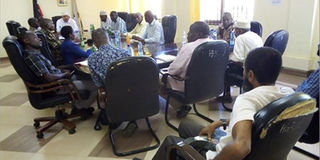Government isolates Lapsset staff to curb Covid-17 spread

Lamu leaders during a meeting on Covid-19 preparedness held at the county headquarters in Mokowe on March 23, 2020. The meeting resolved to enforce a lockdown at the Lapsset project site to prevent possible infections of the coronavirus among workers. PHOTO | KALUME KAZUNGU | NATION MEDIA GROUP
What you need to know:
- Kililana’s Lapsset construction camp has more than 1,000 casual labourers.
- The lockdown will not affect the general construction works at the port which will progress as per the schedule.
- Mr Macharia also said that VIP visits and tours to the port site have been suspended indefinitely.
The government has put the Lamu Port-South Sudan-Ethiopia Transport (Lapsset) Corridor project under total lockdown in a move aimed at fighting the spread of the Covid-19 pandemic in the country.
The lockdown takes effect immediately.
The announcement was made Monday by Lamu County Commissioner Irungu Macharia shortly after a county level engagement meeting on Covid-19 preparedness held at the county headquarters in Mokowe.
The meeting brought together the county security team, the county government of Lamu led by Governor Fahim Twaha, health officials, the Kenya Ports Authority and Lapsset representatives.
DEADLINE
All the Lapsset workers staying outside the camp have been asked to report to the port site which is situated in Kililana, Lamu West before the lockdown deadline at 5pm Tuesday.
Kililana’s Lapsset construction camp has more than 1,000 casual labourers, most of whom are used to reporting for work at the port in the morning and go back home during the evening.
The workers are drawn from various parts of the county, mostly Hindi, Magogoni, Lamu town, Mpeketoni and Witu while others come from other counties including Tana River, Kilifi, Mombasa and Kwale.
PREVENT INFECTIONS
Last week, the government had announced that it would not quarantine the casual labourers at the Lapsset construction camp and instead directed them to be reporting for work at the port during the day and going back home in the evening so as to avoid congestion at the site.
But while addressing journalists after the Monday meeting, the Lamu County commissioner said they had opted for the lockdown to prevent the possibility of people contracting the disease and infecting others at the camp.
The lockdown will not, however, affect the general construction works at the port which will progress as per the schedule.
LOSE JOBS
The county commissioner said port workers who fail to report before the lockdown deadline will automatically lose their jobs.
“We had a county engagement meeting on the Covid-19 [with] all stakeholders including the county government leadership, the security team as well as Lapsset and KPA representative. We even visited the port site in Kililana today. In the meeting, we adopted a raft of measures to limit the spread of coronavirus in the county. One of the measures is the total lockdown for all the Lapsset workers. From today (Tuesday), all the workers are supposed to report to work at the camp and there will be no going back. We won’t as well allow anyone to visit the port until further notice. All this is done to curb the spread of Covid-19,” said Mr Macharia.
NO VISITS
Mr Macharia also said that VIP visits and tours to the port site have been suspended indefinitely.
At the same time, Governor Twaha said the county government has done all it takes to ensure the coronavirus is efficiently tackled.
Mr Twaha said designated areas for quarantine have already been set up in the region.
“Our main focus is to prevent the Covid-19 from spreading in the country. That is why we are taking precautionary measures including encouraging our people to maintain cleanliness,” said Mr Twaha.
Lapsset Regional Manager Salim Bunu said he fully supports the lockdown at the site in Kililana.
“The Lapsset lockdown has come on time. In fact, the workers themselves had earlier requested for it. We welcome it as a measure to prevent the spread of the dreadful coronavirus disease,” said Mr Bunu.




